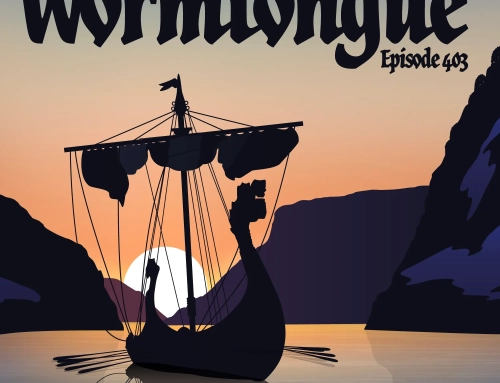The story from Azorean folklore about a sorcerer who turned his life around. He became a priest, helped his people flee, and then faced a choice when his old life came hunting for him.
The creature is a dirty dish towel named the Shirouneri. Like most towels it's actively trying to show you just how much it hates you.
Fictional!
Apple Podcasts: http://apple.fictional.fm/
Stitcher: http://stitcher.fictional.fm/
Spotify: https://open.spotify.com/show/5D3FdZ9Pq286O7owqg7tH5
Music:
"The Theatrical Poster for Poltergeist III" by Chris Zabriskie | “03. Prelude No. 3” by Chris Zabriskie | "49th Street Galleria" by Chris Zabriskie | “Vik Fence Haflak” by Blue Dot Sessions | “Undercover Vampire Policeman” by Chris Zabriskie | "There's probably no time" by Chris Zabriskie
Disclaimer
Similar to Faust, a character dabbles in demon magic and uses it to seduce (i.e. rape) women. Mention of it, but actually no mentions of the words "sex" or "rape."







Check out the book “Sorceress of Angra” if you can find it. Based on a true story of a woman accused of witchcraft in the Azores Islands
This is the Antillia story, but it’s a lot more detailed than I’ve seen before.
It seems to synthesize the Antillia narrative with the legends of St. Cyprian. In the first part, the sorcerer is the stand-in for Cyprian but the Cyprian legend is set in Antioch, and his change of heart was from falling in love with a member of the Christianity cult, Justinia. Cyprian’s books are seen as the books of feitiço (Iberian witchcraft) and are supposed to have been written by Cyprian on the order of the devil before his conversion.
The older versions of the Antillia story replace the sorcerer with a mortal king and his daughter was a gift from the fae folk who had to be raised in the cities of the faeries.
This version seems to have the usual trappings of Catholic syncretism and anti-muslim tropes. Like so much of Europe, even the Acores replaced its fairies, duendes, broxas, with demons and social others.
As far as I know the Azores were “discovered” around the 14th century, how come there’s folklore from the 8th century?
When the islands were discovered it was shown to be already inhabited, they found architecture and ancient things like pots or pillars and drawings in caves or around the islands and archaeologists have said they have been there for thousands of years before it was ‘discovered’ azores was habited by people but due to the period of discovery and no resources maybe, they fled and found a new home
Whats the name of the story that this is from? I’m having trouble finding it because I’m not sure how to spell the main characters name.
Look for “Bispo Genádio e as sete cidades.” (I couldn’t find much in English.)
Don’t feel bad; I’m Portuguese and it took me a good half hour to figure out the name was “Genádio” because it’s being pronounced like an Italian name. In continental Portuguese, the “d” is pronounced like a “d” in English, not a “j.” I thought maybe it was a Brazilian pronunciation, but I asked one of my Brazilian students, and he pronounced it “je nah dee oh,” too.